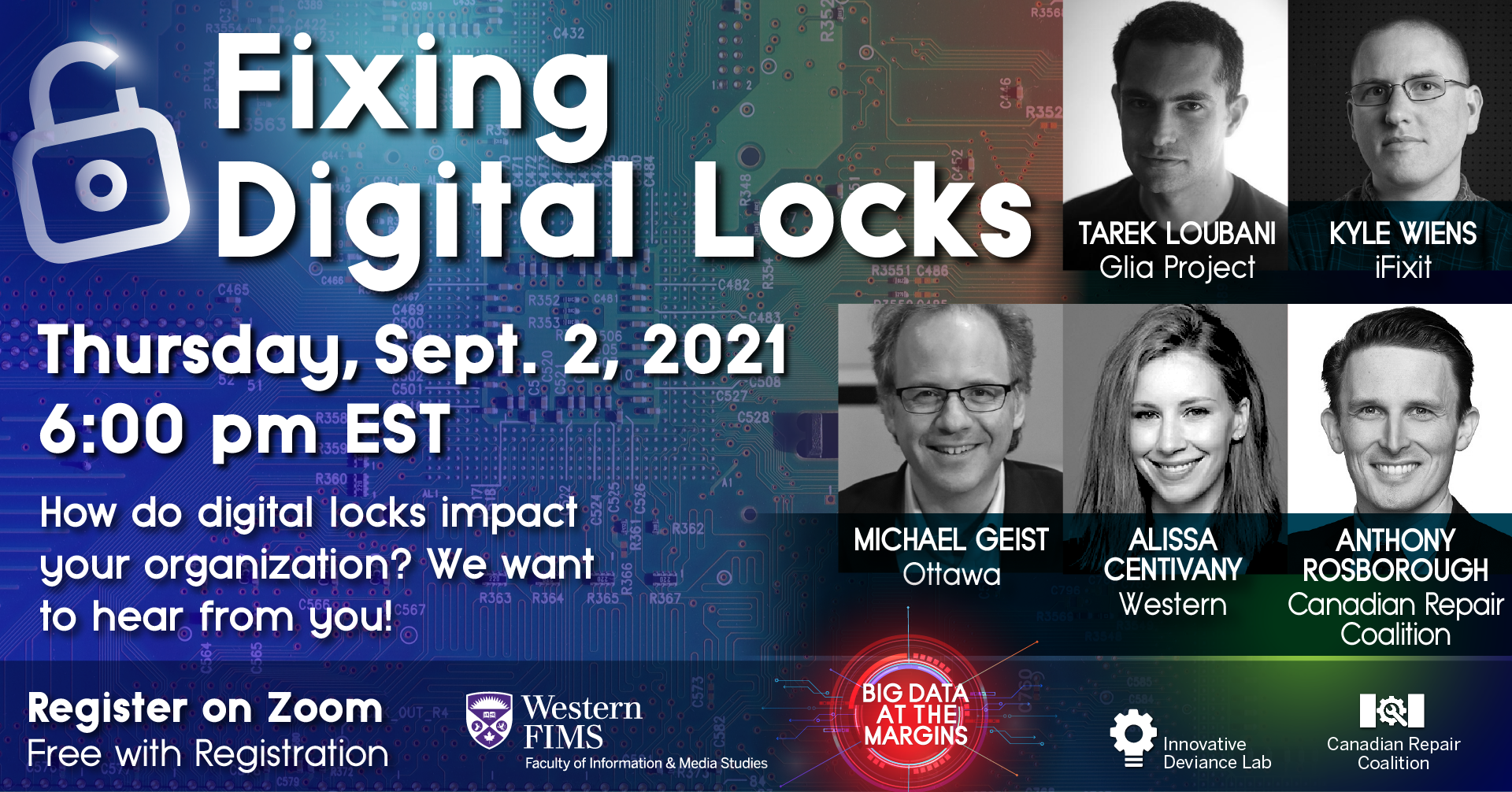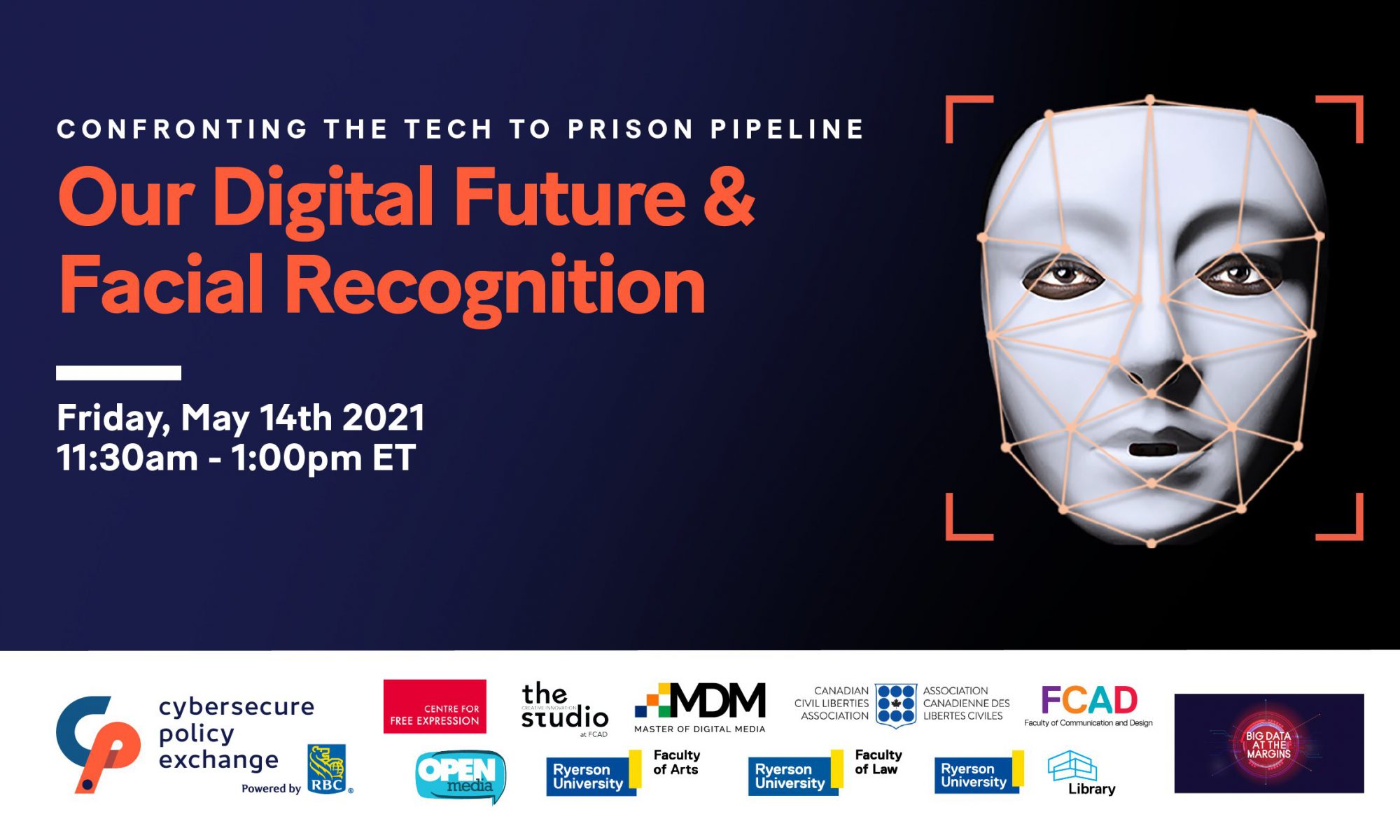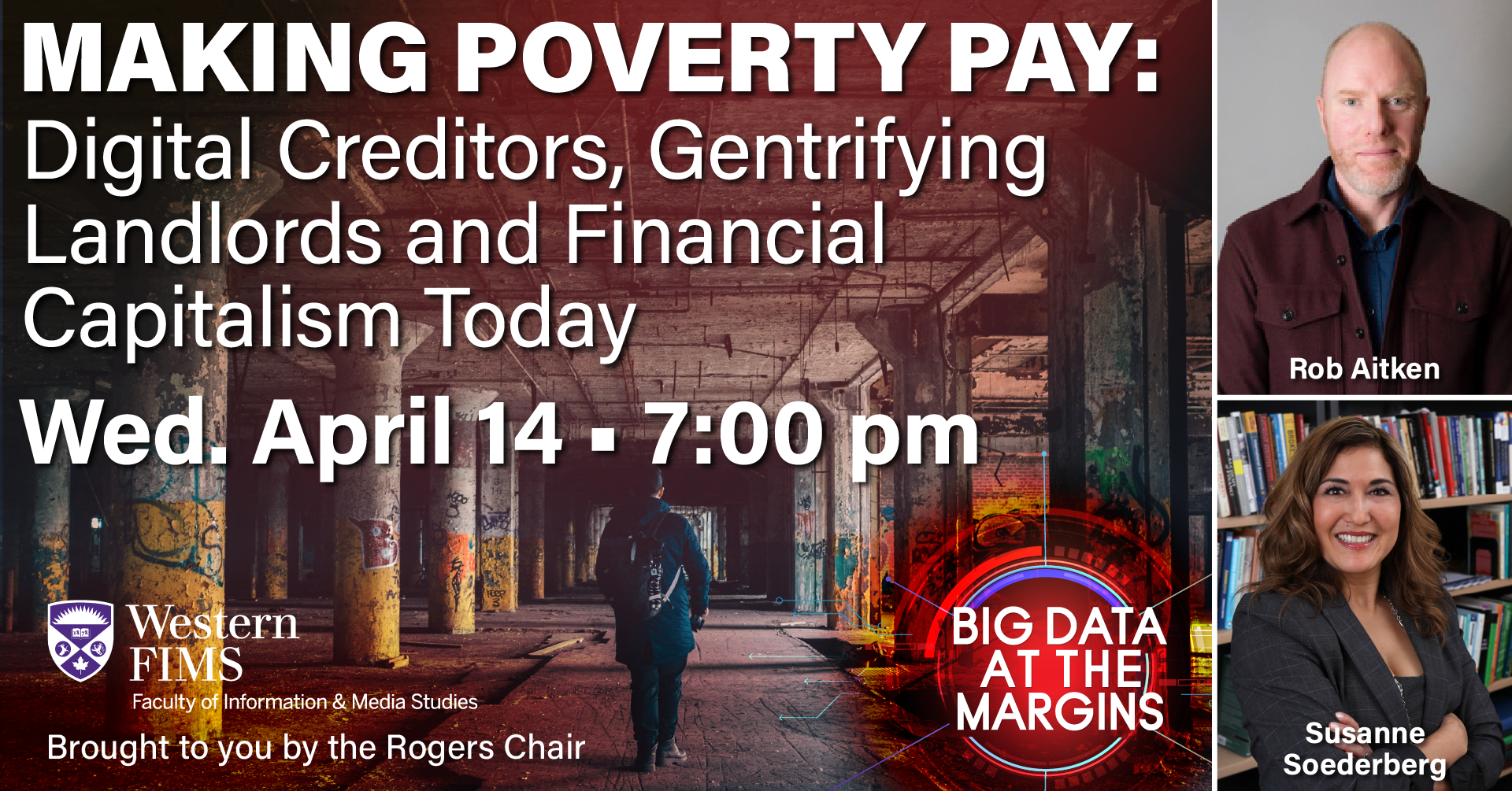Big Data at the Margins is pleased to present the video for our fifth webinar event: “Indigenous Data Sovereignty & Indigenous Futures“!
The Right to Repair: Event Video
Big Data at the Margins is pleased to present the video for our fourth webinar event: “The Right to Repair: Struggles Over Digital Tools and Consumer Rights”
Indigenous Data Sovereignty & Indigenous Futures
Featuring: Jonathan Dewar, Sofia Locklear, and Jason Lewis
Hosted by: Joanna Redden
27 January 2022, 7:00PM
Free Registration: https://westernuniversity.zoom.us/webinar/register/WN_IfDrjNyVQ0Sxei06AYA2Ow
How do Indigenous peoples claim sovereignty over their data and information, and work to transform the very means, methods and values through which “data” is defined and disseminated? How can the exercise of Indigenous data sovereignty and broader computational empowerment enhance and inspire Indigenous identities, representations and futures? How can “data” be Indigenized? Why should settler scholars, organizations, and individuals learn about, support, and respect Indigenous data sovereignty?
The fifth and final event in our Big Data at the Margins series examines the growing movement of Indigenous scholars and activists working to challenge the ethical, legal, and cultural impacts of the colonial imposed and externally mandated forms of data collection about Indigenous peoples and to center the generation of autonomous Indigenous data values and computational visions. Indigenous peoples know all too well the potential harms to well-being, politics and culture that can come from the imposition of settler-colonial data-informed policies. But even while nation-states around the world, including Canada, “commit” to enact the provisions in The United Nations Declaration on the Rights of Indigenous Peoples (UNDRIP), implementation of these provisions continues to rely on data collection by statistical agencies of nation states, NGOs and commercial interests. Uninformed by Indigenous priorities and values, these ‘scientific’ data practices inevitably reinforce the treatment of Indigenous groups as “populations” not as sovereign “peoples” with legitimate claims to their lands, cultures, and resources, including information. In addition to demanding custody and control over externally generated Indigenous data, advocates for Indigenous data sovereignty call for the re-design, collection, dissemination and use of “data” itself, and for the empowerment of Indigenous peoples to define and imagine their own narratives and futures. Autonomous data practices and broader computational skills are vital to Indigenous political and cultural autonomy.
Our internationally recognized group of panelists will guide us through a discussion of the centrality of Indigenous data sovereignty and computational empowerment to Indigenous health, identity, politics and futures. Jonathan Dewar (mixed heritage, Huron-Wendat descent), the CEO of the First Nations Information Governance Centre, is a recognized leader in healing and reconciliation and Indigenous health and well-being education, policy, and research. Sofia Locklear (Lumbee), assistant professor at Western University, has worked with the Urban Indian Health Institute, a Tribal Epidemiology Center serving urban Native communities across the US and specializes in Indigenous evaluation methodologies. Jason Lewis (Hawaiian, Samoan) is the University Research Chair in Computational Media and the Indigenous Future Imaginary at Concordia University and co-directs the Indigenous Futures Research Centre and the Aboriginal Territories in Cyberspace Research Network.
The Right to Repair: Struggles Over Digital Tools and Consumer Rights
Featuring: Frank Pasquale, Steven J. Jackson, and Alissa Centivany
7 October 2021, 7:00PM
Registration is Free: https://westernuniversity.zoom.us/webinar/register/WN_9sfM79OwQ72TxhwbU7gDoA
What happens to our environment, economy, and culture when repairing our things becomes impossible? What would robust and comprehensive provisions supporting meaningful repair look like?
The fourth event in our Big Data at the Margins series examines the challenges and opportunities situated around repair and the burgeoning right to repair movement. Increasingly, technology design is guided by private interests that are antagonistic to repair; manufacturers sell products that, both, appropriate our personal data and deprive us of information about how the product works and how it can be fixed; businesses prioritize sales over repair; and intellectual property and other laws control activities of repair that previously have been commonplace. Impediments to repair affect a wide range of industries, including agriculture, health care, defense, and consumer goods, and their economic, environmental, and social consequences are dire. In the face of these developments, numerous local, consumer movements have arisen to assert our right to repair our things, arguing that an ethos of repair reduces environmental damage, supports local economies and workers, and encourages learning, problem-solving, and creativity. When we work with others to fix things, we build communities and systems of mutual support.
Our internationally recognized group of panelists will guide us through a discussion of the social, economic and environmental importance of the right to repair. Frank Pasquale, Professor of Law at Brooklyn College and author of The Black Box Society: The Secret Algorithms That Control Money and Information is a tireless advocate for consumer rights and education in the tech sector. Steve Jackson, Associate Professor in Information Science and Science and Technology Studies at Cornell University has contributed ground-breaking work on the political and economic importance of repair, and Western University’s Alissa Centivany brings a necessary local focus to this important issue with her ethnographic work on burgeoning right to repair movements in Southwestern Ontario.
Fixing Digital Locks
The Canadian Repair Coalition and Innovative Deviance Lab are pleased to present:
Fixing Digital Locks: Featuring Tarek Loubani, Kyle Wiens, Michael Geist, Alissa Centivany & Anthony Rosborough
2 September 2021, 6PM
Registration is Free: https://westernuniversity.zoom.us/webinar/register/WN_gUjKiTDrREK7EZ2MMCao6Q
Manufacturers increasingly use “digital locks” – bits of code embedded in our devices, appliances, vehicles, and other belongings – to protect their intellectual property, but these locks make it difficult or impossible to engage in repair work. Digital locks can be as simple as a password or encryption that prevents troubleshooting or diagnosing the problem, to more sophisticated co-activation systems that prevent replacement parts from working without “activating” them using special tools or codes held only by the manufacturer.
Canada’s protection for digital locks and other “technological protection measures” came about through the 2012 amendments to the Copyright Act. Originally intended to protect music or creative works stored on digital media, these protections have since expanded beyond the creative industries, infiltrating a wide range of ubiquitous everyday consumer goods as well as devices and equipment in critical sectors like agriculture, defense, health care and more. How ought we balance manufacturers’ interest in protecting their IP with the public’s interest in being able to use, and fix, the things we own? Looking to these challenges, Innovation, Science and Economic Development Canada (“ISED”) has announced an open consultation on Canada’s protection for digital locks.
The goal of Fixing Digital Locks is to hear from you, consumers, fixers and, advocates, on your experiences with digital locks. We want to know how they impact what you do, whether that is fixing your own device, running your business or repairing crucial medical equipment in a hospital. We, the Canadian Repair Coalition and the Innovative Deviance Lab, are co-hosting this town hall to hear from you so that, together, we can better advocate for strong repair rights in Canada.
Our Digital Future & Facial Recognition
Big Data at the Margins is very pleased to partner with Cybersecure Policy Exchange to present: “Our Digital Future & Facial Recognition: the Tech to Prison Pipeline”
On Friday, May 14, join CPX and the responsible tech community for a discussion about facial recognition and our digital future
About this Event
Modern society sits at the intersection of two crucial questions: What does it mean when artificial intelligence (AI) increasingly governs our liberties? And what are the consequences for the people AI is biased against?
Join the Cybersecure Policy Exchange and the responsible technology community on Friday, May 14 from 11:30am – 1:00pm ET for two powerful conversations with leading experts about the role of artificial intelligence in our digital future.
Digital Piece Work: Event Video
Big Data at the Margins is pleased to present the video for our third webinar event: “Digital Piece Work: The New Workers and Geographies of the Digital Economy.”
Making Poverty Pay
Making Poverty Pay: Digital Creditors, Gentrifying Landlords & Financial Capitalism Today
14 April 2021, 7PM
Registration is Free: https://westernuniversity.zoom.us/webinar/register/WN_iiHuAhF5SgSK5X-279GWMA
Facebook: https://www.facebook.com/events/431916264559886/
Website: https://bdam.fims.uwo.ca
Twitter: @bigdatamargins
Featuring: Rob Aitken (Alberta) and Susanne Soederberg (Queen’s). Hosted by FIMS Rogers Chair Matt Stahl (Western).
How is finance capitalism today “making poverty pay”?
For several years now, corporations and governments have been developing systems for accessing and capturing the details of impoverished people’s everyday lives, and for extracting profit out of their day-to-day activities.
The research of Rob Aitken into “alternative credit scoring” examines a cluster of new practices designed to make visible—and extract value from—those people whose economic activity is too marginal to count for the purpose of the formal credit scores that would enable them to buy a car or a house. Susanne Soederberg’s comparative study of the privatization of social housing in European cities reveals how public housing agencies and private landlords subject impoverished people to exploitation, eviction, and erasure, fueling gentrification in cities like Berlin and Dublin.
The work of these two Canadian researchers outlines how impoverished people in North America and Europe are increasingly subject to a “dialectic of visibility and erasure”—made visible so that they can be squeezed for interest on loans and shuffled through social housing and emergency shelters, and erased so that they don’t show up in policy debates or on the streets of gentrifying urban districts.
Making Poverty Pay is generously sponsored by the Rogers Chair in the Faculty of Information and Media Studies at Western University & Big Data at the Margins.
Digital Piece Work
Digital Piece Work: The New Workers and Geographies of the Digital Economy
25 March 2021, 7PM
Make sure to register for our next free Zoom Webinar, open to everyone at Western and beyond. Registration is Free: Click Here.
Digital Piece Work: The New Workers and Geographies of the Digital Economy
Featuring Lilly Irani (UC, San Diego), Lisa Nakamura (Michigan), and Greig de Peuter (Wilfrid Laurier). Hosted by Nick Dyer-Witheford (Western)
How can we support workers in communities on the margins whose jobs and livelihoods are being threatened or transformed by developments in AI, big data and machine learning? How we can demand accountability from the powerful platforms that are engendering these transformations while denying the rights of their workers to fair pay and safe working conditions?
The third in our Big Data at the Margins series examines the ways in which digitization and AI are profoundly transforming the kinds, nature, and location of work, often with severe consequences for those on the social and economic margins or living in smaller towns and rural communities. As traditional manufacturing jobs have disappeared or moved overseas, new forms of AI and digitization have moved in, threatening jobs such as construction, maintenance, food preparation, service and agricultural work, and pushing workers into new forms of ‘gig’ or ‘micro’ work – short-term, standardized, precarious and low-paying jobs, which take place primarily on powerful digital platforms such as Uber, Task Rabbit, or Amazon Turk. These jobs are most often held by women, young people, migrants, indigenous people and people of colour, intensifying already existing forms of social stratification and deepening economic inequality. And, while these platforms publicly praise their workers as ‘entrepreneurs’ or ‘partners’, behind the scenes they work tirelessly to deny, punish or bust any attempts by workers to organize unions or demand legal recognition and protections.
Our internationally recognized panelists will address the impact of AI and digitization on the nature of work and the implications of these transformations for workers and their communities. The award-winning work of Lilly Irani, an associate professor at the University of California San Diego and member of the AI Now Academic Council, looks at the ways digital platforms deploy the discourses and practices of entrepreneurialism to justify further exploiting and disempowering workers around the globe. Lisa Nakamura, Director of the Digital Studies Institute at the University of Michigan and member of the Precarity Lab, is a leading scholar in the examination of race and digital media whose recent work looks at the ways in which precarity unfolds across disparate geographic regions and practices, consolidating the wealth and influence of a few and further marginalizing women, migrants and people of colour. Greig de Peuter, associate professor at Wilfred Laurier University and co-founder of Cultural Workers Organize, explores the re-composition of labour politics today, as artists, contract workers, interns, self-employed, freelancers, part-timers and other flexible labour forces seek to collectively confront precarity and financial and social insecurity.
Digital Policing: Event Video
Big Data at the Margins is pleased to present the video for our second webinar event: “Digital Policing: Facial Recognition Software and Community Resistance.”







